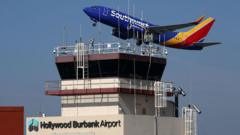Air Canada flight attendants initiated a strike earlier this week with the powerful slogan, "Unpaid work won't fly," spotlighting the long-standing issue of unpaid labor in the aviation sector. For decades, cabin crew in North America were not compensated for their time spent on the ground prior to flights. In contrast, European airlines have tended to offer monthly salaries to their flight attendants, leading to a surprising response from Canadian passengers who largely supported the striking workers.
The strike disrupted travel during the busy summer season, but it led to a tentative agreement between the Canadian Union for Public Employees (Cupe) and Air Canada. While specific details of the agreement remain undisclosed, initial reports indicate it includes a pay raise over several years and, for the first time, compensation for pre-flight critical duties such as boarding and cabin checks. This is a notable shift which experts argue could influence pay structures across the continent's airline industry.
The adoption of ground pay has been echoed by other airlines, including Delta Airlines, which first began compensating its workers for ground duties in 2022, followed by American Airlines and Alaska Airlines. John Gradek, a Montreal aviation management expert, suggests that Air Canada’s new policy could lead to a widespread change in how airlines handle wage structures for cabin crew.
Historically, the aviation industry justified the absence of ground pay by claiming that operational tracking was simpler with time recorded only when planes were in motion. However, this narrative has been impacted by the Covid-19 pandemic, which introduced new safety protocols that increased the workload for flight attendants on the ground. According to experts, this shift has contributed to heightened awareness and urgency around the issue of unpaid labor, prompting flight attendants to advocate for compensation.
Air Canada officially stated that their cabin crew would now receive what they describe as "industry-leading compensation," thus sanctioning ground pay. However, questions remain regarding the approval of the new deal among flight attendants, many of whom are still dissatisfied. The future of the agreement is also uncertain due to a prohibition on further strikes, which means unresolved wage disputes may require arbitration.
Air Canada’s developments have implications beyond just their workforce. Major players like Air Transat and WestJet will be evaluating their own compensation structures during upcoming contract negotiations to remain competitive, hinting at a potential shake-up in the North American aviation sector.
This strike was also seen as a pivotal moment for labor rights in Canada, with the union's determination to maintain their stance against government intervention gaining significant public support. The union's actions highlight a new chapter in labor relations for cabin crew across North America, possibly setting a new standard for compensation practices in the industry.






















